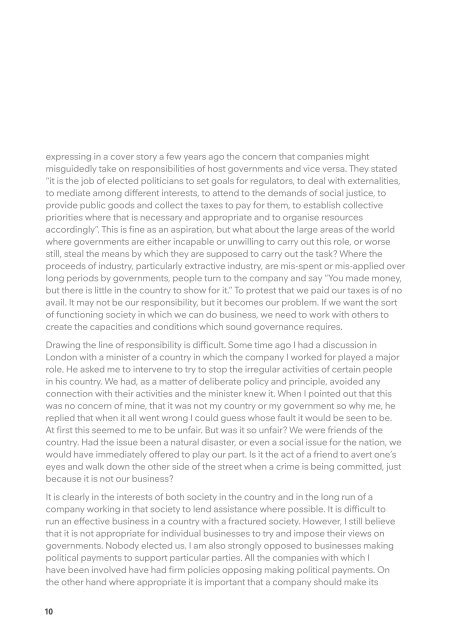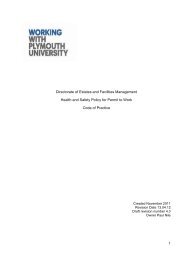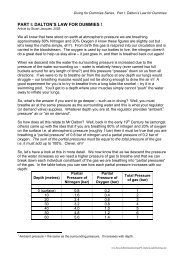Download a .pdf of Sir Mark Moody Stuart's full Beyond ... - Plymouth
Download a .pdf of Sir Mark Moody Stuart's full Beyond ... - Plymouth
Download a .pdf of Sir Mark Moody Stuart's full Beyond ... - Plymouth
Create successful ePaper yourself
Turn your PDF publications into a flip-book with our unique Google optimized e-Paper software.
expressing in a cover story a few years ago the concern that companies mightmisguidedly take on responsibilities <strong>of</strong> host governments and vice versa. They stated“it is the job <strong>of</strong> elected politicians to set goals for regulators, to deal with externalities,to mediate among different interests, to attend to the demands <strong>of</strong> social justice, toprovide public goods and collect the taxes to pay for them, to establish collectivepriorities where that is necessary and appropriate and to organise resourcesaccordingly”. This is fine as an aspiration, but what about the large areas <strong>of</strong> the worldwhere governments are either incapable or unwilling to carry out this role, or worsestill, steal the means by which they are supposed to carry out the task? Where theproceeds <strong>of</strong> industry, particularly extractive industry, are mis-spent or mis-applied overlong periods by governments, people turn to the company and say “You made money,but there is little in the country to show for it.” To protest that we paid our taxes is <strong>of</strong> noavail. It may not be our responsibility, but it becomes our problem. If we want the sort<strong>of</strong> functioning society in which we can do business, we need to work with others tocreate the capacities and conditions which sound governance requires.Drawing the line <strong>of</strong> responsibility is difficult. Some time ago I had a discussion inLondon with a minister <strong>of</strong> a country in which the company I worked for played a majorrole. He asked me to intervene to try to stop the irregular activities <strong>of</strong> certain peoplein his country. We had, as a matter <strong>of</strong> deliberate policy and principle, avoided anyconnection with their activities and the minister knew it. When I pointed out that thiswas no concern <strong>of</strong> mine, that it was not my country or my government so why me, hereplied that when it all went wrong I could guess whose fault it would be seen to be.At first this seemed to me to be unfair. But was it so unfair? We were friends <strong>of</strong> thecountry. Had the issue been a natural disaster, or even a social issue for the nation, wewould have immediately <strong>of</strong>fered to play our part. Is it the act <strong>of</strong> a friend to avert one’seyes and walk down the other side <strong>of</strong> the street when a crime is being committed, justbecause it is not our business?It is clearly in the interests <strong>of</strong> both society in the country and in the long run <strong>of</strong> acompany working in that society to lend assistance where possible. It is difficult torun an effective business in a country with a fractured society. However, I still believethat it is not appropriate for individual businesses to try and impose their views ongovernments. Nobody elected us. I am also strongly opposed to businesses makingpolitical payments to support particular parties. All the companies with which Ihave been involved have had firm policies opposing making political payments. Onthe other hand where appropriate it is important that a company should make itsown views plain openly and publicly, with the reasons behind the position. This is acontribution to an informed public debate.Would coordinated action by businesses be more acceptable? Even where industrylarge and small can reach agreement on a policy, I think that there is always a dangerwhere business in isolation expresses a view that this view will be biased in favour<strong>of</strong> business. Even where this is not the case, there will be a lingering suspicion thatthere are commercial interests behind the opinion. Incidentally, I think it is equallyunacceptable for organised labour to try and impose its will on an elected governmentby strike action.Alliances between corporations and civil society organisationsDoes this mean that business should simply sit on the sidelines? I think that in thelast fifteen years or so there have been a number <strong>of</strong> issues where business and civilsociety have come together to address a particular problem. This suggests a fruitfulway forward. These alliances between business and civil society started in relationto trade and consumers, for example with WWF and Unilever working together onsustainable fisheries or through the Forest Stewardship Council. Other initiatives havesince developed. Arising from the “Publish what you pay” campaign by Global Witnessand the Soros Open Society Foundation, the Extractive Industries TransparencyInitiative was launched by the UK government and is now hosted by the Norwegiangovernment. It involves oil, gas and mining companies publishing what they payto host governments and the host government declaring what they have received,both being independently audited. It may be possible to extend this transparency tothe vitally important ultimate use <strong>of</strong> the government revenue. To its great credit, theNorwegian government has itself signed up to the initiative, weakening the charge thatthis is just a case <strong>of</strong> the global North dictating their values to the South.Similarly the Kimberly Process, which grew out <strong>of</strong> concerns over the use <strong>of</strong> diamondsas a source <strong>of</strong> funding for conflict, now covers 99 percent <strong>of</strong> diamond productionand prevents the fuelling <strong>of</strong> conflict. In another example, the Voluntary Principles onSecurity and Human Rights were developed through co-operation between the UKForeign Office and the US State Department, with involvement <strong>of</strong> major companiesand human rights NGOs. The Voluntary Principles provide agreed guidelines for theuse <strong>of</strong> armed security, the evaluation <strong>of</strong> risk and the steps to be taken if governmentforces are used. Proper application <strong>of</strong> these principles helps protect companies fromaccusations <strong>of</strong> complicity in human rights abuses.10 11
















